- Home
- Anne Rivers Siddons
Hill Towns Page 2
Hill Towns Read online
Page 2
“What did it feel like?” I answered Joe when he first asked. “To tell you the truth, it made me feel rather special. Everybody bent over backward to make me feel accepted, not to feel…singled out because my grandfather was a campus janitor, and not even the head honcho at that. I think I was pretty much Trinity’s poster child for a long time. Papaw wouldn’t even speak my father’s name by then, but I knew the name on the seminary was mine, and somehow I knew that half of me, anyway, was connected to the college in an important way. After a while Mrs. Pierce, the provost’s wife, put her foot down and said it was a disgrace for Bishop Compton’s great-granddaughter to sit on the steps with the mops and brooms all day, and she took me into her own house with her housekeeper. I pretty much grew up there weekdays; I went to the little Trinity kindergarten, and the faculty children came to play with me, and it got so I went to all the right little Mountain birthday parties and play groups and then to Montview Day. I know my Compton grandparents paid my tuition and probably kicked in a good bit more in those earliest days, but I think they must have sent it straight to the Pierces, or maybe there was a discreet little fund established at the school. The bequest came much later, after they died. I know if they’d sent money to my Cash grandparents’ house, Mamaw Cash would have given it all to her church. She was practically handling snakes by that time.”
Joe’s eyes shone behind his rimless round glasses. More Faulkner; this was beyond his wildest dreams. I could practically see a monograph taking shape inside his long, elegant skull: “The Survival of the Gothic Tradition in the American Southern Highlands.”
“Too bad it all had such an ordinary happy ending,” I said.
He wouldn’t surrender so easily.
“That’s not the way I heard it,” he said. “I heard you went through a god-awful time with your Cash grandparents before they died. Christ, no wonder you don’t want to leave this place. It must seem like the only refuge you ever had.”
I didn’t bother to ask who had told him about the other side of my childhood, the side that prevailed when I went home each afternoon with Papaw Cash. Anyone could have. It was part of the cherished Legend of Catherine Compton. I heard much later that another professor, a pale young man in the music school who much admired the ballads of John Jacob Niles, had made up a folk song about me once while drunk on jug wine at a faculty party: “The Ballad of Cat Compton.” It amused me when I finally heard it, in my early thirties and safe in my stone house on the Steep overlooking the entire valley, with Joe and our daughter Lacey. But it would have embarrassed me no end if I had learned about it at the time. Back then I wanted only to put every vestige of my life in the dark vine-strangled shack on the other side of the Mountain behind me and melt into the body of Trinity.
Dark…dear Lord, the darkness around that house and in it! Not only the darkness of the enshrouding kudzu and creeper vines that finally came to hold the black weathered boards together; not only the darkness of the encircling pines and the wet gray lip of pure mountain granite that beetled over it, so that between trees and rock you never saw the sun or the blue of the sky unless you went outside and stood in the front yard. No, the darkness in the house of Burrell and Mattie Cash seeped from the very walls and canted floors; from the stained rag rugs and cracked linoleum and the few pieces of scarred old dark fumed oak furniture; from the black iron stove and the wash pot in the kitchen and the listing moss-slick outhouse in the pines behind; from the mean small fireplaces in the four rooms that lay cold and dank and empty except in the very dead of winter; from, it seemed to me, the very stuff of my grandparents’ shapeless lye-boiled clothing, to which my own clothing was nearly identical; from their dark closed faces and shuttered, black Cash eyes.
I never knew why my grandparents were so cold and angry; it was not entirely at my father, and at my mother’s shameful death with him on the chain bridge, for they were silent and angry even before that. I remember distinctly that I really feared going to their house when my parents were alive, and was always cold there, and finally my mother did not take me anymore. None of Rosellen Cash’s older brothers and sisters lived in their parents’ house that I can remember. All of them had fled it as soon as they could find sustenance for themselves elsewhere. Three Cash aunts had married when they were sixteen and could legally do so and moved to the flatlands, where they raised what seemed to me entire phalanxes of dark, jeering Cash cousins. Two Cash uncles had also fled to the flats but did not marry and seemed to spend most of their time raising hell. They were said by Papaw to be sorry and by Mamaw to be damned, and I did not see them at all, even after I went to live in their childhood home.
I think now that the darkness in that house—the metaphorical darkness, not the physical, which was entirely corporeal—had its genesis in the madness of my grandmother Mattie Cash. I believe it was that madness that I smelt when I was small, like a young animal smells hidden blood, and feared her house as if it had been a charnel house. And I think it is an apt measure of the terrible fear of randomness, of murdering chance, that was born in me when my parents died that I chose that house rather than the benign house of my Compton kin. Mattie Cash was obliquely mad then; an outlander might mistake it for simple mountain reclusiveness, the queerness of old ways, and perhaps a long skein of inbreeding in the blood. There was more than a little of that in those hills then, born of proximity and inaccessibility and sheer xenophobia. But the skewedness that poured from the old house like invisible smoke was madness pure and simple, and in my grandmother’s case it chose, as its object, God.
My grandmother was a religious fanatic from the day she was converted by a hellfire-screaming, circuit-riding preacher in her sixteenth year on the other side of the Mountain from Trinity College. By the time her daughter died naked in her lust and I came to her, she was drunk on God. By the time my grandfather began taking me to work with him, she was so deeply possessed by the Holy Ghost that even he, stone-cold man that he was himself, feared she would harm me if I were left alone with her. Mamaw never ceased trying, with cries and threats and apocalyptic quotes from the Old Testament or Revelation, to convert anyone who came within range of her terrible God.
And he was terrible. He was a God of fire and blood and vengeance, who demanded of his followers flesh and fealty and money and whatever else they had. He took and he judged and he damned. In my grandmother’s ruined mind, he left it up to her to save and instructed her to do it with her tongue and her hands and her broom and even the occasional kitchen knife, if the occasion for that arose. She murdered one of Papaw’s two prized heifers, destined to fatten and thrive and keep us all in milk and butter for winters to come, because her God demanded of her, one steaming July day, the sacrifice of a fatted calf. She went after the social worker from the county, who heard about the calf and came to see how I was faring, with the same knife. Only the intervention of the pastor of the church to which my grandmother was indentured, and my grandfather’s promise to keep me away from her, saved her from being committed then and there to the state mental facility in Knoxville.
Papaw wasn’t stupid or mean, only frozen in his bitterness. He could see the trouble my slender fairness and the betraying chocolate eyes of my mother portended for me. As for Pastor Elkins, he was indeed a snake handler and half mad himself, but he was a consummate fund raiser. His ramshackle prophecy-haunted tabernacle in a tangled hollow at the base of the Mountain owed half its provenance to the money Mamaw appropriated from Papaw’s wages, money kept aside to feed and clothe us. Even more largesse flowed from the sums my Compton grandparents sent regularly for my schooling and general well-being. I don’t doubt that those gentle, cultivated Anglicans financed the upkeep of more than one thick, sluggish, deadly Mountain rattlesnake or water moccasin. Pastor Elkins looked upon his handmaiden’s rapt, mad face and saw there many more years of affluence from the Tidewater before I attained my majority. He smiled his bleached feral smile at the county folks and promised there would not be any more unpleasantness from
Sister Cash.
“She is God’s daughter in her heart,” he said. “She’s only just got so full of the Holy Spirit that it runs over sometimes.”
“Holy Spirit, my behind. That old bat is as crazy as a bedbug,” I heard the young woman from the county say to her supervisor as they got back into the battered county sedan and bumped out of our yard.
The next morning I went for the first time up the winding road to Trinity College with my grandfather in his old truck and passed for the first time under the arch and into the Domain.
“Yes,” the small part of me deep inside that knew about such things whispered. “This is right. This is the place.”
And when the first of the faculty members passed me, sitting quietly, as my grandfather had bidden me, on the gray stone steps of Lawler Hall, where the college’s administrative offices were, I raised my head and looked straight at them and smiled.
“It’s a pretty morning, isn’t it?” I said, and when they invariably stopped and asked me my name and whose little girl I was, I said my name was Catherine Rose Compton, and my mama and daddy were dead, and I lived now with Papaw, who made the college clean. And smiled again.
I was six years old, then, and on that day saved myself.
“And the rest, as they say, is history,” I told Joe soon after I met him. I told Joe everything about me soon after we met, except the manner of my parents’ death. And that came just a little later, for it was only months after we met that I knew we would marry and I might, with luck, stay forever on the Mountain. Only then did I feel I could trust Joe with the thing at the heart of my fear of leaving the Mountain, though I knew from the beginning I would have to explain.
I told him, finally, on a day when he had asked me to go with him down off the Mountain and over to Chattanooga, to hear an organ concert in one of the big Episcopal churches there. Like many other new converts to Trinity’s Oxbridgian magic, Joe had fallen in love with all things Anglican and wanted Passionately for me to go with him and hear Bach and Palestrina played on the new organ at St. Anselm’s. I simply could not do it, but no excuse would serve. I was abundantly healthy, lived in one of the dormitories and would have been warmly encouraged by my housemother to attend the concert, and by that time was seeing no one but him.
“I have all the God up here I need,” I said finally. “I don’t need a dose of anybody else’s.”
He looked at me in thinly veiled alarm. Joe was a good Congregationalist boy from a poor, rocky little village in rural Vermont; he was both beguiled by and still a bit wary of the lush half-mystic eccentricities of the Domain. I think some buried puritan part of him expected me suddenly to forsake the orderly, dreaming gray and green spell of Trinity and start handling serpents myself.
“I’ve often wondered what you must have made of God, after those early years,” he said. “I mean, your grandmother’s fanaticism, and then up here, all this, your great-grandfather and Compton Hall. God must have confused you terribly. Nothing about him was consistent for you.”
“I don’t think I was confused, exactly,” I said. “What did I know about consistency? I just concluded there were two of him. One for up here and another one for…you know. Out there. Down there.”
“Cat,” Joe said. “What is this out-there down-there business? Why won’t you leave this mountain? What are you afraid of?”
And so I told him. And he wept. And I knew I would marry him if he asked me, and he probably would. And he did, not long after that day.
I fell in love with him on the first day of his seminar, in the winter of my senior year, when he came into class wearing a gray flat-topped Confederate officer’s forage cap. Atop his thick fair hair, with his silky, full mustache and short golden beard, the cap looked wonderfully easy and contemporary; it was like meeting Jeb Stuart himself, or someone equally mythic and dashing. His academic gown was flung carelessly over a worn Harris tweed jacket, his blue oxford-cloth collar was unbuttoned, and his tie was jammed into a hip pocket. His eyes were blue and full of a kind of swimming light behind the round wire glasses, and his features were narrow and sharp and tanned by whatever he had been doing the previous summer, before he had come to Trinity. We heard he had been snatched away from somewhere like Yale or Williams and was considered a great asset to Trinity. He was the first of the influx of young Ivy-League-educated faculty Trinity managed to lure south at the start of the seventies, that decade of greatest change, and those of us who had qualified for his elite senior seminar sat silently and stared at him. He did not speak, only stood still, hipshot, in the forage cap and looked back at us. He was tall and very thin.
“Hey, y’all,” he said, in a truly terrible parody of a southern drawl. His voice was flat, nasal, and harsh, with two hundred years of New England in it. He fairly honked. We burst into laughter and he grinned, and I caught my breath sharply.
He was the image of my father when he smiled, of my young father as he smiled down at my mother and me on a long-ago sunny day on the edge of the Steep, in the only photograph I had of him. Mamaw had searched out and burned all the others.
“My name is Joe Gaillard,” he said. “Josiah Peabody Gaillard. The Josiah and the Peabody are Vermont Yankee from back to Adam, but the Gaillard is a Cajun merchant marine who met my mother in Boston on her high school class trip and married her three hours before I was born. I just figured I’d get things off on the right foot and let you guys know you didn’t have the lock on Gothic down here.”
We laughed again, and I was lost.
2
I MARRIED HIM ON THE AFTERNOON OF MY GRADUATION from Trinity, in austere little St. Rhoda’s Chapel, in the sacristy wing of All Souls. I think we could have filled the great pennon-hung main Chapel if we had chosen; the entire college was infatuated with our marriage. Fads pop up like mushrooms after rain on the Mountain, and we were that season’s craze. Relatively little creeps in from off the Mountain to divert Trinity even now, and it was doubly so twenty years ago. Even the firestorm of unrest and change that consumed the country in the early seventies reached the Mountain only as an echo.
Oh, there were nods to the times. Women students came to Trinity. A good proportion of the faculty was recruited off the Mountain, from other parts of the country and abroad. Male and female hair alike brushed the shoulders of the black academic gowns, blue jeans belled at ankles and tie-dye was everywhere, and the sweet smell of another kind of smoke curled into the air of both student and faculty parties. The music that flowed from lit windows was as much protest as plain-song, as much rock as Respighi. But the Mountain held its own. The Domain prevailed. The dream at the top of the world that is Trinity has never been completely breached by the present. The Age of Aquarius drifted over the Mountain like smoke and did not settle.
The few people we had chosen to see us married were so quintessentially of Trinity that in the dim light it might have been a twilight in the forties, the twenties, or even the closing of the last century. Flowered hats bloomed, and white gloves, and the ubiquitous seer-sucker suit. I wore a simple white eyelet dress that Cora Pierce had married in, with wildflowers from the Steep in my hair, and Joe wore his Dartmouth doctoral hood over his Trinity gown. We had to ask official ecclesiastical permission for him to do that, but the Reverend Dr. Scofield had offered no objection. It was very much Trinity’s own wedding, ours was, and somehow the hoods and gowns of academia were right.
Dr. Scofield had known both of us since we came to Trinity. He was, to me, as much a part of All Souls as its famous rose window. I knew it was largely his good offices that had prevailed upon the college not to interfere with Joe’s courtship of me. Student-faculty relationships were forbidden then and are frowned upon even now. But, as I said, Joe was Trinity’s first golden boy from the Ivy League, and I was their poster child. Joe had melted any incipient resistance by simply going to Dr. Pierce, still our provost and my unofficial guardian since the death of both sets of my grandparents, and formally declaring his honorable intentions toward
me. I think he may even have asked for my hand, though he insists that he did not.
Dr. Pierce conferred with Dr. Scofield, who said, in the lovely Anglican rumble that had propelled him straight up the Mountain to All Souls decades earlier, “If exceptions to rules cannot be made in this, the very bastion of the thinking man, we should cease calling ourselves a liberal arts institution.”
“And besides,” Mrs. Pierce told me later that he said, “it solves the problem of Catherine’s future very nicely. I have often worried that she would choose a husband not of Trinity.”
“Or not choose one at all,” I said to Joe later, laughing. “This way you get to support me, and the Compton stash can go into the general fund. What if the school had had to dish out for me until I was ninety-five?”
When they died, five years before, quietly and peacefully within four months of each other, my Compton grandparents had left to the theology school a much larger bequest than had been anticipated, but with the stipulation that my full tuition, room, and board be paid from it, plus a generous living allowance, until I either married or died. When one of those eventualities occurred, the balance would revert to the school to use in any way they saw fit. Dr. and Mrs. Pierce were asked to administer the fund and oversee my welfare as long as I stayed on the Mountain, and since I had been living with them ever since my Cash grandparents died when I was thirteen, in the final fire set in the old house by mad Mattie Cash, they agreed—I think, happily—to do so.

 Colony
Colony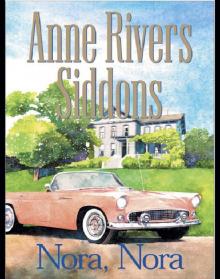 Nora, Nora
Nora, Nora House Next Door
House Next Door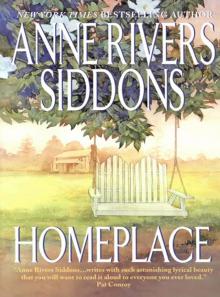 Homeplace
Homeplace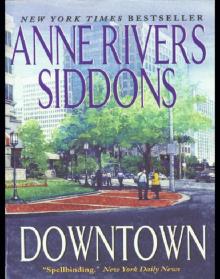 Downtown
Downtown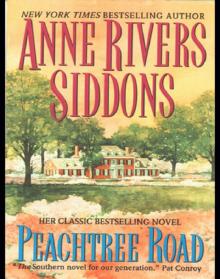 Peachtree Road
Peachtree Road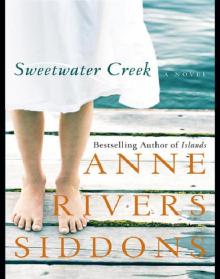 Sweetwater Creek
Sweetwater Creek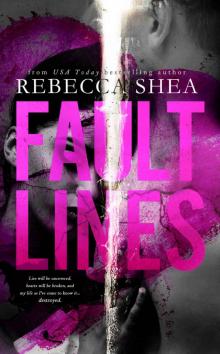 Fault Lines
Fault Lines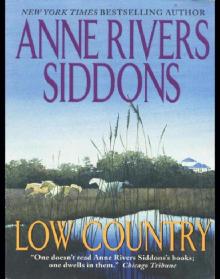 Low Country
Low Country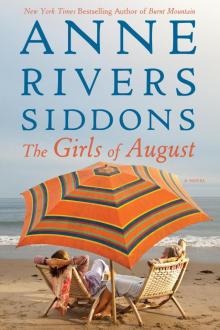 The Girls of August
The Girls of August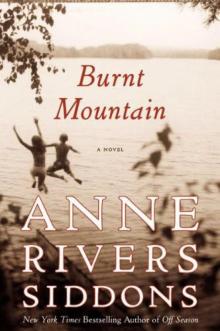 Burnt Mountain
Burnt Mountain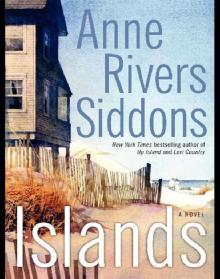 Islands
Islands